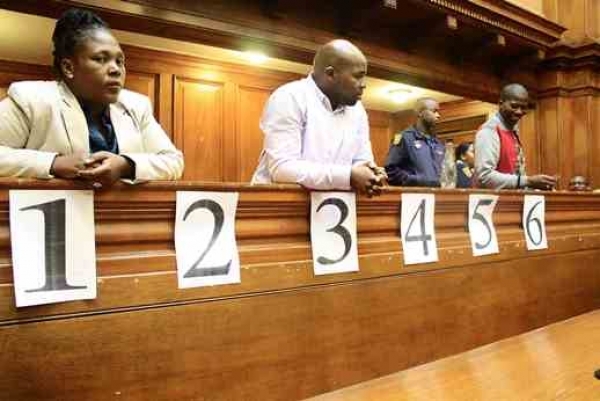

Angy Peter and her co-accused in the Cape High Court in 2014. Photo by Masixole Feni.
30 April 2015
On Thursday, Social Justice Coalition activist Angy Peter escaped imprisonment and was given leave to appeal the sentencing.
Peter, her husband Isaac Mbadu, Azola Dayimani and Christopher Dina were convicted last year in the Cape Town High Court. She was sentenced to 10 years for the murder of Rowan du Preez and three years for the kidnapping. Judge Robert Henney said the sentence would run concurrently. Following the conviction, the judge had suggested that restorative justice would be more appropriate than prison. However, things changed when Peter refused to say that she had killed Du Preez.
Reading the judgement, the judge said that when the social worker interviewed the four found guilty, none of them showed any remorse for their actions. He said Peter refused to apologise to the victim’s family. She showed anger and said she had not killed Du Preez even though the court had found her guilty.
Henney said Mbadu, Dayimani and Dina had apologised to the family, however the apology did not come from their heart.
“Accused one [Peter] told the court that the deceased [du Preez] stole her television, but that didn’t give her a right to kill him,” said Henney.
He said even though the deceased was a criminal and committed lots of crime, he did not deserve to be killed.
Henney described Peter as a person with a big ego. He said the case had revealed Peter’s dark side.
During the trial, it was argued by defence counsel Advocate William King, that Peter was framed by Mfuleni police because she was leading the Khayelitsha Commission of Enquiry which was investigating the Khayelitsha police.
Henney said Peter acted innocently in front of the community, telling people not to take the law into their own hands, while she took the law into her own hands. Henney said Peter’s act was to make sure the case looked as though she had been framed by the police.
He said the best sentence for the four would be life in prison, but he had to consider the fact that Peter has four children. “But that does not mean accused one will get a lesser sentence than the other accused, because she looks after her family. If they had called the police, the deceased would still be alive,” said Henney.
After reading the judgement, the defence asked the judge if he would grant the accused leave to appeal the sentencing. In his submission, King said the applicants were not given a fair trial. He said the applicants were convicted on the hearsay statement of a single absent witness [Du Preez], who was under the influence of alcohol; the accused were denied the right to challenge or confront his evidence; the police docket was a chaotic jumble.
Henney granted the leave to appeal and extended the bail period. Should the appeal be unsuccessful, all four accused must report to the court within 24 hours, if not, a warrant of arrest will be issued.